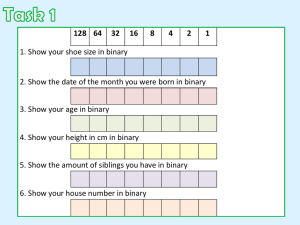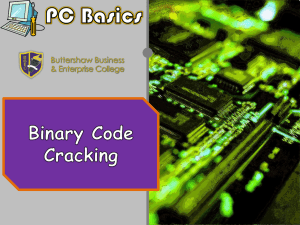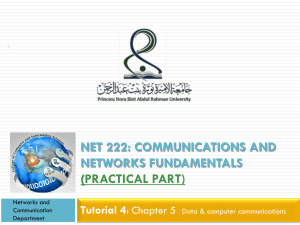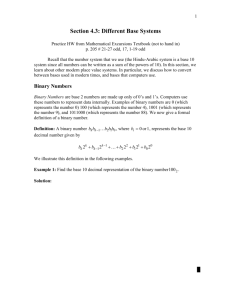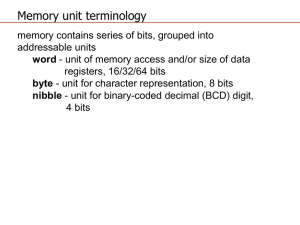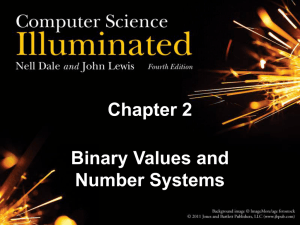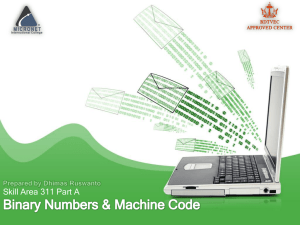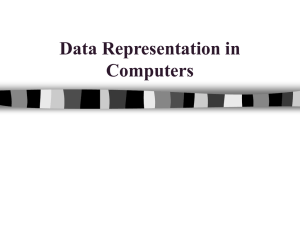Binary Numbers
advertisement
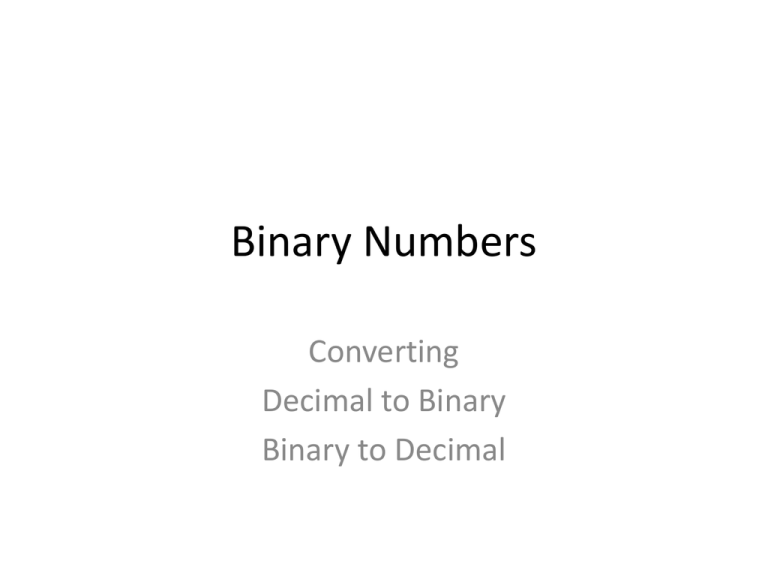
Binary Numbers Converting Decimal to Binary Binary to Decimal Base-Ten Place-Value System The sleek efficient number system we know today is called the base-ten number system or Hindu-Arabic system. It was first developed by the Hindus and Arabs. This used the best features from several of the systems we mentioned before. 1. A limited set of symbols (digits). This system uses only the 10 symbols:0,1,2,3,4,5,6,7,8,9. 2. Place Value. This system uses the meaning of the place values to be powers of 10. For example the number 6374 can be broken down (decomposed) as follows: 6 thousands 3 hundreds 7 tens 4 ones 6000 61000 3 610 + 300 + 3100 2 + 310 + 70 + 710 1 + 710 +4 +4 +4 The last row would be called the base-ten expanded notation of the number 6374. Write each of the numbers below in expanded notation. a) 82,305 = 810,000 + 21,000 + 3100 + 010 + 51 = 8104 + 2103 + 3102 + 5100 b) 37.924 = 310 + 71 + 9(1/10) + 2(1/100) + 4(1/1000) = 3101 + 7100 + 910-1 + 210-2 + 410-3 Write each of the numbers below in standard notation. a) 6105 + 1102 + 4101 + 5100 = 600,000 + 100 + 40 + 5 = 600,145 b) 7103 + 3100 + 210-2 + 810-3 = 7000 + 3 + .02 + .008 = 7003.028 Multiplying and Dividing by Powers of 10 If a number x is multiplied or divided by 10 this causes a “shift“ in the decimal point to the right (multiplication) or the left (division) since all powers of 10 are increased or decreased by 1. 𝑥 = 𝑑1 𝑑2 𝑑3 . 𝑑4 𝑑5 𝑑6 𝑑7 ⋯ 10𝑥 = 𝑑1 𝑑2 𝑑3 𝑑4 . 𝑑5 𝑑6 𝑑7 ⋯ 𝑥 = 𝑑1 𝑑2 . 𝑑3 𝑑4 𝑑5 𝑑6 𝑑7 ⋯ 10 If x is multiplied or divided by a higher power of 10 then the decimal point is shifted by the same number of places as the power of 10. Binary Numbers Binary or Base 2 numbers are very important in today's technological world. They form the numerical representation of numbers in a computer or any digital device cell phone, ipod, DVD, etc. This is because a electronic device can best detect one of two states either electrical current is flowing or it is not. The light bulbs that are on represent the base 2 digit 1 and the ones that are off represent the base 2 digit 0. Base 2 Base 10 0002 0 0012 1 0102 2 0112 3 1002 4 1012 5 1102 6 1112 7 1001012 = 37 Dienes Blocks Light Bulbs Base Two The important details about base 2 are that the symbols that you use are 0 and 1. The place values in base 2 are (going from smallest to largest): Binary Point 25 (32) 24 (16) 23 (8) 22 (4) Change the base 2 number 1100112 to a base 10 (decimal) number. 1100112 11 = 1 12 = 2 04 = 0 08 = 0 116 = 16 132 = 32 51 21 (2) 20 (1) 2-1 (12) 2-2 (14) 2-3 (18) 2-4 1 (16 ) Change the base 10 (decimal) number 47 to a base 2 (binary) number. 47 2 = 23 remainder 1 23 2 = 11 remainder 1 11 2 = 5 remainder 1 5 2 = 2 remainder 1 2 2 = 1 remainder 0 1 2 = 0 remainder 1 47 = 1011112 2-5 1 (32 ) Converting Fractional Parts of Numbers 3 Convert 0.011012 to base 10. Find the first 5 binary digits of the fraction 5 0.011012 1 1 1 × 32 = 32 1 0 0 × 16 = 32 4 1 × 18 = 32 8 1 × 14 = 32 0 0 × 12 = 32 13 32 2 × 35 = 65 = 15 + 1 2 × 15 = 25 = 25 + 0 2 × 25 = 45 = 45 + 0 digits 2 × 45 = 85 = 35 + 1 2 × 35 = 65 = 15 + 1 ⋮ 3 = 0.10011 ⋯2 5 13 0.011012 = 32 Multiplying and Dividing by Powers of 2 If a number x is multiplied or divided by 10 this causes a “shift“ in the binary point to the right (multiplication) or the left (division) since all powers of 10 are increased or decreased by 1. 𝑥 = 𝑑1 𝑑2 𝑑3 . 𝑑4 𝑑5 𝑑6 𝑑7 ⋯ 2 2𝑥 = 𝑑1 𝑑2 𝑑3 𝑑4 . 𝑑5 𝑑6 𝑑7 ⋯ 2 𝑥 2 = 𝑑1 𝑑2 . 𝑑3 𝑑4 𝑑5 𝑑6 𝑑7 ⋯ 2 Repeating Base 2 binary digits 3 Find the first 5 binary digits of the fraction 5 2 × 35 = 65 = 15 + 1 2 × 15 = 25 = 25 + 0 2 × 25 = 45 = 45 + 0 digits 2 × 45 = 85 = 35 + 1 2 × 35 = 65 = 15 + 1 Once we see that the fraction 35 has occurred again after I multiplied by 2 this pattern will continue. This gives me the entire binary expansion of 35. This is what is referred to as a repeating binary number. 3 = 0. 10012 5 Change 𝑥 = 0.101102 to base 10. 𝑥 = 0.101102 = 0.10110110110 ⋯2 32𝑥 = 10110.110 ⋯2 = 101102 + 0. 1102 = 22 + 0. 1102 4𝑥 = 10.110 ⋯2 = 102 + 0. 1102 = 2 + 0. 1102 32𝑥 − 4𝑥 = 22 − 2 20 5 𝑥= = 28 7 Move binary point 5 places Move binary point 2 places Subtract each side Solve for x
